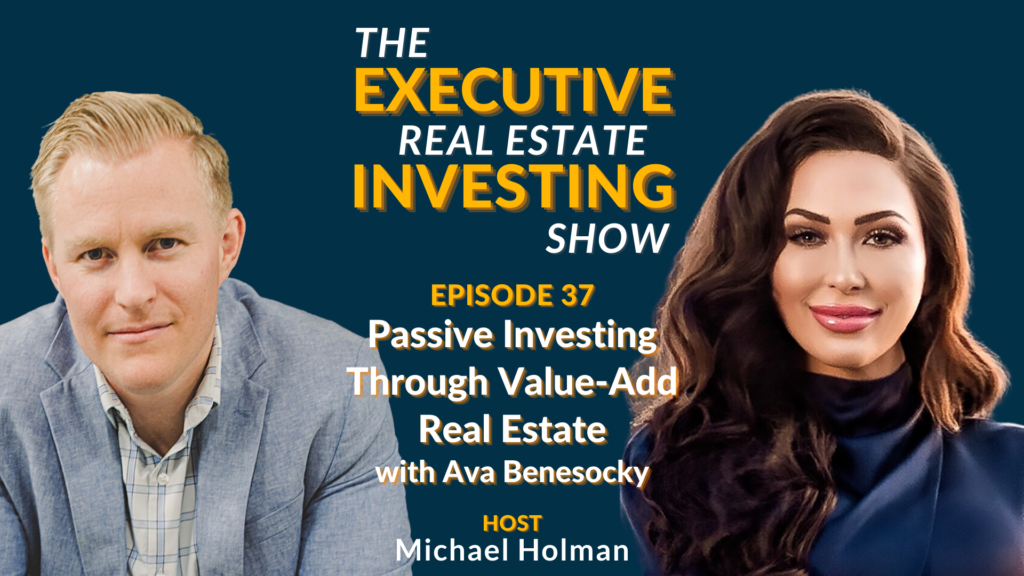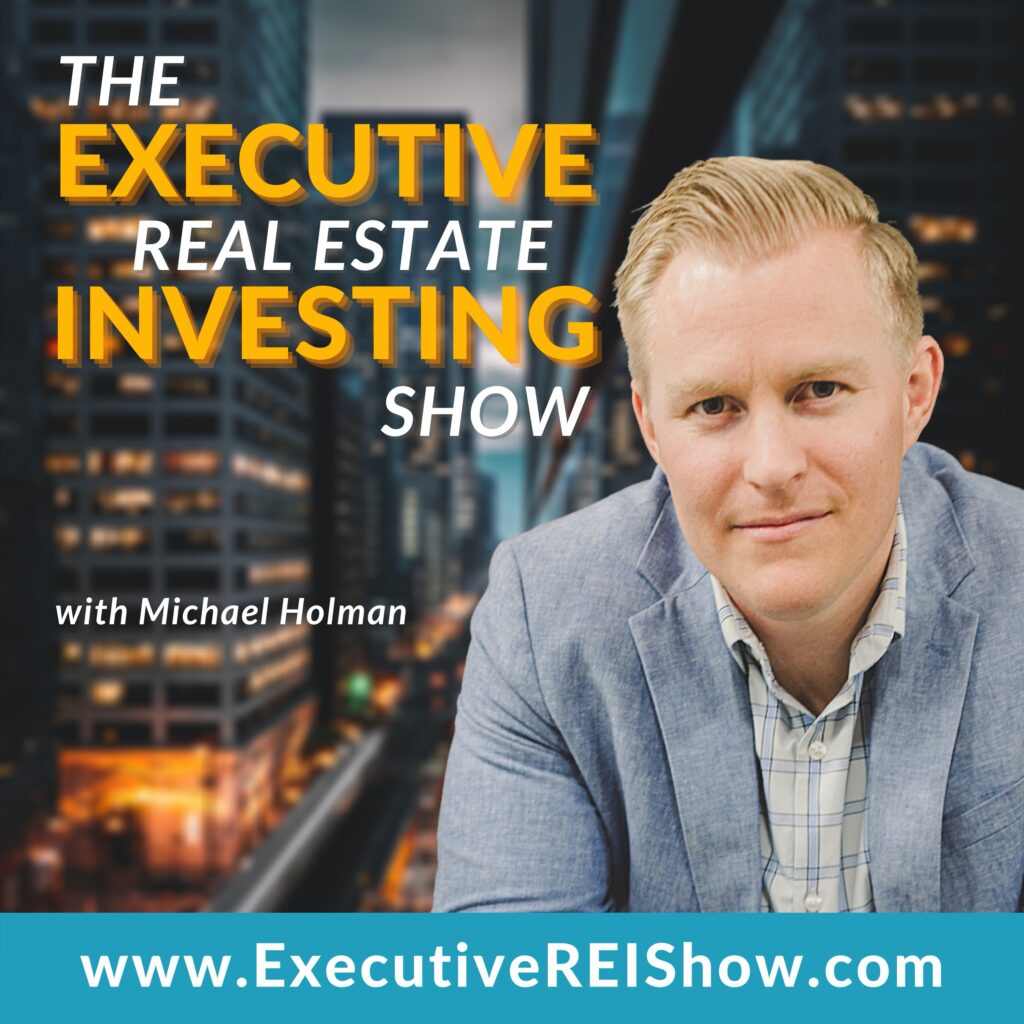
The executive Real estate investing Show
EPISODE 37
Passive Investing Through Value-Add Real Estate with Ava Benesocky
- February 14, 2022
EPISODE SUMMARY
Tapping Into the Investor Mindset. This week on The Executive Real Estate Investing Show, host Michael Holman talks with Ava Benesocky.
In just over a decade in real estate, Ava Benesocky and CPI Capital have rocketed to the top of multi-family investing in Canada. CPI sets their sights on deals in the U.S., and offers both Canadian and U.S. investors a chance to have truly passive income through value-add properties. Ava bursts with energy as she describes the “Investor Mindset,” basically, thinking beyond saving for retirement. What if you could have a source of income with monthly distributions, with no hassle?
Listen now as Ava walks us through her first triumphs and failures, and how she had to recenter her mind to open the door for lasting success.
EXECUTIVE TIP
Get Real With People
LISTEN TO THE PODCAST HERE

The Executive Real Estate Investing Show Podcast
EP 37: Passive Investing Through Value-Add Real Estate with Ava Benesocky
Listen on
READ THE TRANSCRIPT HERE
Note: Audio transcription has been automatically transcribed
Welcome to The Executive Real Estate Investing Show. This podcast is for you, the busy business owner or executive looking to create generational wealth. Here, we’re going to show you how to do that through real estate investing from multifamily to industrial and everything in between. You will become a real estate investing expert. And now, here’s your host, Michael Holman.
Michael Holman: Hello everyone and welcome to another episode of The Executive Real Estate Investing Show. As always, I’m your host, Michael Holman. Super exciting guest. I feel like I’ve been saying that every single week lately, but honestly, we’ve just been getting such good guests. Every single one is amazing. I can’t shortchange any of them. So that is why I’m saying this every single week at this point. But today’s guest, Ava Benesocky, she lives up in Canada, she helps a ton of Canadian and some US Real Estate investors invest in US multifamily. It’s fantastic. You want to know the thing that I love most about this, she at the very beginning, she gets very vulnerable about her journey, very applicable. If you’re in business, you’re in Real Estate investing, this is a very applicable thing, because you see everybody who just has all of these, it just looks like they have it made and from the very beginning, they never had any struggles, there is never any issues. Eva goes into just a glimpse of what it takes to be successful in Real Estate investing, and very translatable to being successful in business as well. I’m really excited to get into this.
Before we get started www.ExecutiveREIshow.com, you hear me say it every single week and it’s even more true. Go over there, you’re going to get a lot of good information, you can ask an executive question, you can sign up for our newsletter, you can check out the show notes. Today in her episode, Ava even talks about a book that she co-authored with 10 other women, we’re going to have that link in there. Go ahead, check out www.ExecutiveREIshow.com. It’s awesome, you’re going to love it, I promise, you will not be disappointed about the content that you see there. Also, if you’ve been listening for a while, and you like the show, you like what you’re listening to go ahead and leave us a rating review, Apple podcasts, Spotify, YouTube, wherever you’re listening or watching to this, go ahead and leave us a review, hit subscribe. We want to get this out to as many people as possible.
Lastly, and always, before we get going, we’re going to start with today’s executive tip. Today’s executive tip is to get real with people. That means be okay opening up to people, be okay showing your vulnerabilities as well as the successes. People often think that that makes you look weak when you get real with people and that’s not the case at all. When you get real with people, you’ll find that they see you as human. They see you as hey, that’s somebody who’s been through similar struggles that I have, and have overcome and achieved. That’s why people love biographies and autobiographies so much, because they get into the details of the good and the bad and give you a roadmap for how to be successful later on. Getting real and being real with people is so, so beneficial makes you feel so much more authentic than anything else you can do. Today’s executive tip, get real, and you’re going to see Ava about to get real all in this interview. We’re going to get right into it.
Hello, everyone, and welcome to another episode of The Executive Real Estate Investing Show. I am your host, Michael Holman. I am so excited today. We have a guest, feels like she’s been everywhere. I finally actually got her to come on the show. I only had to message her like, I don’t know, six months ago, I finally got on the list. This is my lucky day. I guess. Everyone we have Ava Benesocky with us. Really, really excited to have you on the show Ava.
Ava Benesocky: Thank you so much for having me, Michael. I love your energy so I’m excited to have a great conversation today.
Michael Holman: Fantastic. I have this problem. A lot of times, I just get going and I don’t know how to stop. Everyone’s like stop yelling into the microphone. I can’t help it. On my volume thing they’re always telling me to turn it down to the very lowest volume.
Ava Benesocky: It’s beautiful. Keep the energy going.
Michael Holman: For those of you who might not know Ava, she has done a ton in the Real Estate investing space. She started CPI Capital. She lives up in Canada, which is fantastic. She’s also done a ton with women in private equity groups. All sorts of amazing things here. Honestly, I’m looking at this bio, and the things that I know about Ava, and I don’t even I feel like I can do it justice, talking about all the things and stuff that she’s currently working on. Ava, tell us about yourself.
Ava Benesocky: Thank you so much for having me today. I’m CEO of CPI Capital. Our mandate here is we partner with passive investors as limited partners to acquire value add multifamily assets in the US, and we’re located across the sunbelt states. I’m also an author, I co-authored a book with a incredible woman across Canada and we talked about how we found success through Real Estate investing. I’m the YouTube host of Canadian passive investing Academy, which I’ll have to get you on there. We bring on all Real Estate experts. We talk all about Real Estate investing and wealth building topics and we add a lot of value. We were mentioning; I learned a lot as well by bringing guests on. What else is it? I’m a thought leader in Real Estate, private equity. That’s a little bit about me.
Michael Holman: Ava has done a ton of stuff, and one of the things that I love to just start with, because one of the things that most people might not know a ton about you is the fact about this book, I’d love to talk about this book that you wrote, what was it titled and who do you write it with?
Ava Benesocky: I wrote it with, there’s 10 authors in total, it’s a woman empowerment book, and it’s called From Ordinary to Extraordinary. The whole point of the book was to inspire other women to take action on getting involved in Real Estate investing, because what we did was, we told our stories, we got vulnerable about our stories, and we kind of said, hey, listen, we started here and now we’re here, because this is the kind of the journey we went on. We overcame fears, we were resilient and so forth. It’s kind of like if I can do it, so can you. It is to really inspire a lot of women out there.
There was this one lady who called me after reading the book, and she’s like, Ava, I’ve been so scared, because a lot of people let fear get in the way, they don’t take the next step to investing or doing things that can change their lives around. This lady called me, and this really hit home for me, she’s like listen, I’ve been waiting a year to take a move on Real Estate investing. But after reading the book, I went and put an offer in on a triplex. It really did change some people’s lives and that’s what we wanted. We really wanted to inspire people get their minds going and start taking action when it comes to Real Estate. It’s been really great. We got best-selling on Amazon and everything else. We’re kind of spreading the word.
Michael Holman: I had to ask. I have a four-year-old daughter and I’m dealing with all of these things right now. She asked me all these questions, and I don’t know how to answer. Luckily, she’s got a mom to help her through this. But this kind of thing is really interesting to me and one of the things that you’d mentioned as you were writing the book, you said, everyone got really vulnerable. I would love to dig down, what about your section of that book or the part that you authored, what part of that felt vulnerable to you?
Ava Benesocky: Great question, actually. I tell my story. I’m a small city girl, I grew up in a small town in Alberta, the province next to it and I grew up there, everybody still lives there. They all have their families. My whole family still lives there, and I was always this entrepreneur. I think it’s a part of me. I was born an entrepreneur; I was always this entrepreneur. I was in Real Estate. I got started in Real Estate at a very young age at 22 years old. I did really well in my small town because everybody knew me. I grew up there. I had that know, like, and trust. But again, everybody was getting married around me, having kids and I felt like there’s this big world out there and I was missing out a little bit, even though I had everything one could desire. I sat my parents down one day, and I said mom and dad, I’m going to move to the big city, and that’s in the province over and that’s Vancouver city, where the Real Estate is like 10 times the price and everything else and I didn’t know a single soul out here.
What I did was I packed my fashion in the back of my car, I left my incredible career, I’ve sold my primary residence, and I came out to this big city where I didn’t know a single soul. There was a lot of fear and of course everything else, but I’m like, you know what, I’m going to go, I’m going to go take over that big city and I’m going to become a top producer, Real Estate agent in this big city. I remember driving into the city and the opportunity that was like right in front of my eyes. I was so excited. I’m like I’m going to take over the city. Well guess what reality hit me really hard, really fast and all the stuff I was doing back home the systems and everything that I had. I had a known address, not a single soul knew me here. It was one of the most difficult things I’ve ever had to deal with. It hit me hard.
Success did not happen at all right away. I went through this two years transition time one thing after another, the market crashed in Vancouver. Even successful Realtors were having a very difficult time and it was really bad. Lots of calls home to mom and dad, and they’re like, come back home. What are you doing, you have everything here. What are you doing, get your butt back here and I said, absolutely not. I came here for a purpose. The world works in mysterious ways. I stuck it through, and I stayed resilient. I surrounded myself with really great people. I ended up meeting my business partner today, August Finneas and we ended up connecting and started talking about pain points that exist for Canadian investors.
The more and more we talked, the more and more we were discussing things, our company CPI Capital was actually started because of this problem that we saw that Canadian investors were having, and we wanted to find a solution to that problem. That’s the story where I get vulnerable, I talk about like, literally the biggest dip of my life, and how resilience and how kicking the fear in the butt and not letting it stop you from following your dream to figure that there is more, there is something out there, just keep going and you’ll find it. That’s what I talked about in my book, and it all led me to boom, starting my Real Estate, private equity from the ground up with my business partner. Because of that resilience and everything else. Anybody listening, if you want a copy of the book, just reach out to me, and I’ll send you a copy of the book.
Michael Holman: We will for sure stick all this in the show notes as well, so you don’t have to frantically be writing everything down. One of the things that I love that you mentioned and this journey in this path, you just gave us a little glimpse of what everything was like and how that transition happened for you. It is so applicable to today’s world. Especially in business and in Real Estate investing. For some people, those are one in the same, for some those are two separate things. Their business and their Real Estate investing are two separate things. But the thing that I love that you mentioned is you gave us a glimpse of success doesn’t come overnight. It doesn’t just happen. Oftentimes it comes, it’s born through some of these dark times in our lives that we have to try and figure out and get creative and move on.
I love that you mentioned that because especially today in today’s world, it feels like everybody is just, if you’re successful, you’re uber successful from the very beginning or you don’t tell anybody or show anybody anything about not being successful. You are on social media and suddenly, the next thing you know, there’s just somebody who’s really, really successful in their business, it’s like they never failed, they just boom, they just appeared, everything went perfect for them and that’s not the case at all. That’s not how it works for you. That’s how it works for me. That’s not how it works for 99.9% of the world. Whether you’re getting started in Real Estate investing, and you’re struggling to get started.
Whether you’re working on a business or not. Ava’s story is very relatable. In fact, I have a very similar story, I left a very secure, comfortable job. I came to work for my father, and everybody viewed it as oh, you’re walking into this amazing job. We had our own really difficult issues. There were weeks, it was like, I don’t know how I’m going to pay payroll next week. We had to deal with that and those are things that we had to overcome as well. Ava, I love that you shared that. I love that you got vulnerable with us for a second because it’s very real. Talk about starting CPI Capital. Talk to me about the early beginnings of that. You talked about why you started CPI Capital. When you finally made that decision. Walk us through the next little period.
Ava Benesocky: I really liked the comment that you made there because social media and just viewing somebody people think that oh, my God, that person boom, they had success. But there’s a story. Everybody has that underlying story and it’s really cool to dive deep and that’s why I wanted to tell mine because it doesn’t just happen like that. It does take a lot of hard work, but I’m looking forward to hearing your story one day too. I’ll get you on my show. CPI Capital, what did it look like when we first started out? We started a little bit different than most people. Most people would start out small, they’d buy duplex, and they move their way up to a four plex and then a 10 unit. We’re not really talking. This is just 10 unit multifamily.
Not even an institutional size,100 plus stories. We saw the types of returns investors were achieving on these large institutional multifamily assets by utilizing Real Estate syndication. The concept where you’re pulling everybody’s capital together, most beautiful business model in the world and I could talk about why we don’t do it in our own backyard. But we’re focused in the US because cashflow, appreciation, forced appreciation, all these amazing things that I wanted to bring to the Canadian fingertips and to US investors. But we started out different, we started off wanting, we had our investor kind of database, we wanted to bring institutional multifamily asset to our investors. We started off like that.
Our first deal, we brought a large deal to the table and presented it on a platter to our investors and said, hey, these are the benefits by fractional Real Estate investing, do you want a little piece of the pie and really created the streamline investment process, where again, everybody who’s listening to this, we’re all about partnering with busy professionals, because they don’t have the time, or the knowledge or the expertise to put their money into Real Estate, they want to pass it off to somebody, let them take care of all the heavy lifting, and they want to sit back and build wealth possible while they sleep, I always love to make the joke, but that’s how we started CPI Capital.
Our first deal that we brought, we brought a beautiful institutional sized multifamily asset to our investor community and that’s how we began. We started off by building a powerful brand, by building a big investor community, a place where people can come. It’s about the investor experience. We started off by having our community and then by bringing them a beautiful multifamily asset. It was actually in Orlando, Florida our first.
Michael Holman: I got to ask how big was that multifamily project?
Ava Benesocky: It was big, it was a 350 unit.
Michael Holman: Ava, you are speaking my language right now. I have to say this is so relatable to the same mindset and thought process that I have, and my company has, and I love hearing this. Because I think oftentimes people’s biggest failure in life is they think too small. Oftentimes, they get scared. They just don’t know. But it’s amazing what you can do and what it can accomplish when you set your sights way above where everybody thinks you should be setting them and then go for it. The mindset that we have right here between the two of us is perfect.
Overland was started by my father, Ken, his second development deal that he ever did was 400 units partnering with GE Capital. That was deal number two and you look at it even nowadays, it feels like every single time we get involved in a deal people look at us and just think you’re not supposed to be here. This is for somebody with more money, more experience, more power, more everything and you know what, you keep getting it because you find ways to get it done. That’s when you get creative, and I always say that the big deal is when you get in these pinches and backs against the wall. That’s when you get creative. That’s when you figure out a solution. That’s when there’s no plan B so I love the go big mindset.
Ava Benesocky: Me too. You’re killing it today. Everything you’re saying I’m relating to this; this is awesome. People limit themselves, they let numbers scare them. This business is relationship business. It’s about a team sport. It’s about having the right systems in place and knowing your lane and understanding, hey, I’m really good at this. That person is really good at that. Let’s collaborate. Let’s join and let’s take over the world. But you’re right, a lot of people limit themselves and they don’t even allow themselves to even think it’s possible in a lifetime to do these types of things. So again, it goes back to that mindset that I talked about in my book. It’s about the mindset and you can accomplish the world. It’s all up here.
Michael Holman: One thing I want to point out too that most people on the show understand but if you’re new and this is one of your first episodes, I want to point this out. Ava talks about syndication and syndication is one of those things where essentially you pull together a bunch of money and you go buy a big Real Estate asset. There’re some nuances with that but a big picture 10,000-foot level that’s generally what it looks like. I love that she had mentioned passive because you hear all these people say I want passive income, I want passive income. One thing to note for everybody, if you go buy a single-family home, and it’s most likely not going to be passive, if you’re the only owner, especially if you’re managing it, it’s not going to be passive, you’re going to be fixing toilets, you’re going to be getting calls.
Even if you have a property manager, you’re still the one that’s going to get the calls because that property manager is going to call you and say, hey, my roofs broken, the roofs leaking, we have this big expense, what do you want to do? You still have to make those decisions and be involved in that way. When she talks about being truly passive syndication is one of those ways that you can get in and be truly passive. Give your money to somebody else, let them do the work and get a return and that’s how you can leverage the power. I love that she mentioned that, and I wanted to really dive down deeper.
Ava Benesocky: A lot of people don’t know what they don’t know. There’s this fine line that exists between being an active and passive investor. But I can’t tell you how many people have been like, hey, I heard you speaking on this. They contact me because they heard me speaking on a platform. They see me in the news or something like that. They’re like, this is really cool. I’m so sick of having properties. I just don’t want to deal with it anymore. I can invest in Real Estate, a tangible asset, let you take care of everything and still get those.
We give monthly distributions at my company. We’re given those monthly paychecks and I’m like, yeah, it’s real, this is real. Then you get a check at the backend. But this passive Real Estate investing, fractional Real Estate investing, a lot of people don’t know about it, Michael. So it’s really fun. This is why I’ve dedicated my life to getting on so many platforms to talking about it so that people can understand, hey, I could still invest in Real Estate hands free and then also, you can diversify your financial portfolio with something else that’s not so crazy, like stocks and bonds.
Michael Holman: Especially right now. It’s been all over the place.
Ava Benesocky: All over the place. Exactly. It’s crazy.
Michael Holman: Ava, I want to get into a little bit of the Real Estate. You kind of alluded to this before, what assets is CPI Capital involved in and where?
Ava Benesocky: We love the sunbelt states North and South Carolina, Arizona, Texas, Nevada, Florida. We love the institutional, 100 plus, garden style, multifamily. Already stabilized, already built, we’re looking for some sort of a value-add component where we can have that third party property manager, and the leasing office on site. The value add is what we love the most. I love that you’re doing development as well and it’s really cool because we should collaborate on something. That’s kind of what we’re looking for right now. There’s this value-add component how we can go in there and force depreciate the value of the asset is the most incredible thing I’ve ever seen in my life. Most people when they think of renovating a property, they’re thinking single family. You renovate it. You look at the comparables in the area,
Michael Holman: You think of all those HGTV shows.
Ava Benesocky: You think of comparables in the area, and you’re like, okay, my property’s worth this because the property across the street is worth that. Multifamily doesn’t work that way. It’s like you go in there and you renovate, you turn over the tenants, you increase the NOI, and you’re creating millions and millions and millions of dollars of value just by the first year or two of doing renovations. It’s powerful you guys. It’s so powerful. I always say that they are wealth building machines, and this is kind of why.
Michael Holman: I completely agree to put some numbers to the things that Ava is saying. She’s talking about NOI. Net operating income. If she were to go in there, let’s say CPI Capital, bought an apartment and she was able to increase the NOI say, $20,000. At $20,000 increase in NOI, the average cap rate, and a lot of the market she’s talking about is probably right around that 5% range right now. They’re really low but call it 5%. $20,000, increase, all of a sudden just gave her a million dollars worth of value. $1 million for a $20,000 increase on a yearly basis, so she just raised rents, overall by $20,000, she decreased expenses by $20,000 and all of a sudden, a million dollars worth of value was immediately created.
Ava Benesocky: Isn’t that something, isn’t that crazy? When I get to show in my deal presentations, those numbers to investors, their eyes are like, and we’re talking 200 units, think of 200 units, increase the rents by 150 bucks a month. It’s close to $10 million in value. Like it’s insane. So that’s where investors are like, wow, it’s such an incredible feeling and the business we’re in. It’s just all around. It’s just exciting stuff.
Michael Holman: I completely agree. You talked about CPI Capital I want to go down to see if there’s any differences on a personal level. How about Ava? What is Ava investing in? Are you investing just right alongside of CPI Capital on everything? I’m sure you’re doing that. Are you doing anything else in addition to that as well?
Ava Benesocky: Yeah, little bit of crypto, most of my capital goes into my deals, we have a couple of lentils on the side. But again, most of my capital goes into the deals. Coming from a family of accountants, and we were talking about how you’re in accounting. I’ve also been getting my family to get an investor mindset as well, because they didn’t have that before. It’s really interesting now me teaching my family and my parents about, hey, guys, get your investor minds, get your investor hat on, because there’s a lot of ways that I can help you guys build wealth here.
Michael Holman: When you talk about that investor mindset. I’d love to hear you just expand on that. What do you mean when you say an investor mindset? Because a lot of people are like hey, I’m an investor. I have a 401k. That automatically comes out. Therefore, I’m an investor. What do you mean when you say investor mindset?
Ava Benesocky: Coming from a conservative family and we call it RSP here, so that’s the retirement savings. A lot of people are like, oh, yeah, I got an RSP. I’m set. But that mindset, the logical mindset is like, go to school, get a job, save for retirement and then you’re like, you’re good to go. That’s the logical mindset. That’s not an investor mindset. Investor mindset is like, okay, where can I invest my money, so that if I lost my job today, it has nothing to do with retirement am I going to be okay, and have made smart investments, so that I have alternative sources of income coming my way. A lot of people don’t think like that.
I talk to a lot of incredible sophisticated people, like doctors who are making half a million dollars a year and their biggest fear is that if they got sick today, and they lost their job, because they’re the breadwinner for the family, their family’s not going to be okay. That’s really scary for people to live like that. But you can change that around by putting your investor hat on and getting the ball rolling by taking the money that you’re getting, and then diversifying into whatever you feel comfortable with and wherever your risk tolerance is and then having alternative sources of income. An investor wants that cash flow income coming their way, so that they can live off that cash flow and again, not have this fear. If I lost my job today, then what? Nobody should live like that. That’s too much stress and stress take a toll on your health. Without health, you have nothing in this life. It’s all about a trickle effect.
Michael Holman: I completely agree and something interesting that I want to point out about what you said. You have these doctors that are making half a million dollars and to some people listening, it’s like, oh, my gosh, half a million dollars. How could you ever be worried if you’re making that much? I could say, I personally talked to people who are making $200,000 that have that same mindset that are still worried about how am I going to pay for things, if things went south, or I lost my job.
I’ve talked to people that have been making $2 million a year that have that same concern, it’s kind of interesting, across the spectrum, you could be making $50,000, $100,000, a million plus and it’s kind of interesting, because everybody who’s sitting there, I make $50,000, $75,000 I’m just getting started. I’m trying to grow. How could you ever feel that way when you get to a salary of $500,000 a year. It’s funny, because you talk to these people, and next thing they know, 20 years, fast forward, they’re making three, four or $500,000 and they’re feeling that way.
It’s like, how did I get here? It’s all about that mindset. I love that you point that out because that’s really important for people to understand. It starts at the beginning. A lot of people think once I make a million dollars a year, then I will invest in things. Well, guess what, if you are not investing when you’re making $50,000, you’re probably not going to make it when you get to a million because there’s an infinite number of shiny objects for you to spend that money on that are going to look way cooler than whatever investment you know you should be doing.
Ava Benesocky: That’s the thing somebody makes 500 grand a year. Guess what, they probably bought the big fancy house and the big fancy car. If there’s anybody younger listening to this my biggest advice because I made really good money in Real Estate and I was so stupid. I didn’t have that investor mindset. I didn’t even know about investing. Honestly, I was just like, okay, my parents taught me to save my money. I wasn’t so good at that because I was trying to keep up with the Joneses. I wanted the fancy car, and I wanted the fancy fashion.
If I could go back, if anybody’s listening to this, start by investing, that stuff will come and that won’t give you happiness, let’s be honest. What will give you happiness is by investing that money, and then buying a fancy car or fancy bag or something like that off of passive cash flow that you have coming in. If I could just talk to all the young people out there when they start making money or anybody, not even young people, that stuff will come. I can’t express how important it is to get investing. It’ll change your life around for sure.
Michael Holman: Time is your best friend when you’re investing. That is the one thing, it’s interesting. You can have a million dollars and be investing it and if you’re taking that million dollars, and you’re investing it when you’re 60 versus say when you’re 30, night and day difference. We’re talking 10s or hundreds of millions of dollar difference. Time is your best friend when you’re investing.
Ava Benesocky: Hold off on the fancy stuff guys.
Michael Holman: It’ll come. We’re not saying don’t buy fancy things. I like fancy things. I’m sure Ava maybe you don’t. But I imagine you like fancy things too. You’re not saying don’t buy them. Just do it in order guys investing then buy the fancy things.
Ava Benesocky: It’ll feel really good that way.
Michael Holman: One thing that you said. You’d mentioned health, you’re like, hey, if you don’t have health, what do you have? What do you mean by that?
Ava Benesocky: What I mean by that is mental and physical health. A lot of people just don’t understand or don’t want to understand. Maybe it’s just they were never taught it. But without these two things, you got nothing. Imagine you started making all the money in the world, and then something happened to your health, there’s nothing that money means nothing, you can’t enjoy it nothing like that. For me, priority, priority, priority because I have a lot of responsibility on my shoulders. I have a lot of babies and those are my investors. I have a lot of responsibility. I got to put myself first always. In the mornings, I put myself first at night, I have a nighttime routine, a morning routine, I make sure that my mental health is always intact. If I’m feeling anything that’s out it’s like the number one most important thing.
Physical health, I used to go to the gym to look good. It’s not about that, it’s about keeping your muscles strong, keeping your body strong. Every day I try to make it a priority. Even just for half an hour, go lift some weights, that’s also good for your mental health. I’m very careful with what I eat. Brain food, all that stuff. We have one life to live, let’s live it the best that we can in the most amazing way that we can. And that’s by having good mental and physical health. But it’s very important. I’m sure you have really incredible routines because you have a lot of responsibility. Even if you don’t have a lot of responsibility, and you just have a easy going job again, you want to take care of yourself. I can’t stress how important it is.
Michael Holman: I love that because that’s something that we often don’t talk enough about on this show or shows like this. We get so fixated on the cash and the money. I completely agree. Once you said that, I was fishing because I had an idea where you were going to go with that. I completely agree. Just a quick reminder, anybody who’s listening. You got to keep your physical, mental, emotional, spiritual health intact because Ava said it best. If you don’t have any of that you can have all your money in the world, and it doesn’t matter. I had to fish Ava because I had a pretty good idea where you were going to go with that. Thank you for sharing that.
We’re going to wrap things up here a little bit. We got two questions we ask every single guest who comes on this show. Number one, Ava, what is the best business advice that you were ever given?
Ava Benesocky: Best business advice I was ever given, and it was too late when I was given it. Don’t try to reinvent the wheel. If you want to take over the world or you want to do something, take a look around, see who’s really successful in what they’re doing, in the specific field that you want to do and you could copycat if you will. Don’t try to reinvent the wheel and put yourself under all this stress and everything else. Figure out what systems they’re using and do the same thing. That’s the best business advice I can give anybody, because it’ll truly save you tons of time, tons of stress, and help you kind of reach your goals a little bit faster.
Michael Holman: I think that’s great. I have a good friend who’s really successful. One time I was talking to him about how he was successful, and he looked at me and he said, Mike, here’s why I’m successful. I am not the person who’s out identifying the brand new never heard of opportunities, he said, but I’m really good at seeing what the opportunities that are currently exist right now and taking my slice of the pie. He’s like, that’s what I’m really good at and I love it. It just goes exactly with what you were saying.
Ava Benesocky: When I started CPI Capital, we didn’t do that. We created every system and every process because we kind of have a little bit of a monopoly here in Canada. Not a lot of people like the US there’s a lot of Real Estate syndicators. Buying US properties here in Canada, there’s not a whole lot of people buying US multifamily Real Estate, dealing with two different governing bodies, two different taxations, two different securities compliance, all these things. We did it opposite. We got to do all this stuff and we went through a lot. We had to redo systems, and just reach out. We could have probably reached out a little bit more. But yeah, there we go.
Michael Holman: Great advice. Next question Ava. What Real Estate investing advice would you give other business owners or business executives?
Ava Benesocky: Surround yourself with people who are much smarter than you and have like a tribe of people that you can go to, talk to, learn from, share things with and that’s my advice there.
Michael Holman: The two pieces of advice that you gave, were phenomenal. Honestly, like anybody who’s listening, getting started and who you surround yourself are usually somewhere in the mix on almost every guest and there’s a reason people so go ahead, listen to it, start taking that advice. Ava, as we get wrapped up here and talk about a lot of things. How can people get a hold of you?
Ava Benesocky: I’m super active on LinkedIn, Ava Benesocky, or my email address, CPICapital.ca is our website and my email is Ava@CPICapital.ca easy to get ahold of send me a message.
Michael Holman: For anybody who’s frantically writing, don’t worry, go to www.ExecutiveREIshow.com, click on this episode. You can see all of that in the show notes. You’ll click right into it. We’ll try and track down a copy of Ava’s book. We’ll go ahead and put that in the show notes as well. Thanks for coming Ava.
Ava Benesocky: Thank you for being such a great host. This is a lot of fun.
Thank you for listening to The Executive Real Estate Investing Show. Ready to learn more? Go to ExecutiveREIShow.com for more episodes and resources to help you create generational wealth through real estate investing. That’s ExecutiveREIShow.com.
WATCH THE EPISODE HERE
MENTIONED IN THE SHOW
EPISODE ARTICLE

How to Build an Investor Mindset
We are all about building generational wealth through real estate investing. And the reason we are such advocates for it and try to spread knowledge through The Executive REI Show is that it can profoundly change your life. One thing we love about this industry is that people with all backgrounds, all stories, all goals, and all paths can do this. Our recent guest on episode 37, Ava Benesocky, is no exception. She’s the CEO
EPISODE NOTES
- Ava is the CEO of Canadian-based CPI Capital, which partners with passive investors as limited partners to acquire value-add multi-family assets in the U.S. Currently they concentrate in the sunbelt states: North and South Carolina, Arizona, Texas, Nevada, and Florida.
- Benesocky co-authored a book “From Ordinary to Extraordinary,” which she describes as a woman empowerment book. “The whole point of the book was to inspire other women to take action on getting involved in real estate investing.”
- Ava chooses to be open about her failures along with her successes, so that others can learn from her mistakes. “This is the kind of the journey we went on and we overcame fears and we were resilient, and it’s kind of like, if I can do it so can you.” One reader told Ava that she was inspired to get into real estate because of the book. “She’s like ‘listen I’ve been waiting years to make a move on real estate investing, but after reading the book I went and put an offer in on a triplex.’”
- Ava grew up in a small town in Alberta province. The daughter of accountants, she became excited about real estate at a young age. “I was always the entrepreneur, and I got started in real estate at a very young age at 22 years old. I did really well in my small town, because everybody knew me. I grew up there. I had that like and trust.”
- She could have stayed in that small town and been a mogul. But Ava was hungry for more opportunities. That meant a big change: moving to Vancouver. “I packed my fashion in the back of my car, I left my incredible career, I sold my house and I came out to this big city where I didn’t know a single soul. There was a lot of fear and of course everything else, but I’m like, ‘you know what? I’m gonna go take over that big city, and I’m gonna become a top producer real estate agent in this big city!’” It didn’t work. At least at first. Ava was suddenly a little fish in a big pond.
- “All the stuff I was using back home–the systems and everything that I had [didn’t work in Vancouver]. I had no interest, not a single soul knew me here. And it was just one of the most difficult things I’ve ever had to deal with. It hit me hard.”
- Her parents tried to convince her to move back home. But Ava was undeterred. “I said ‘absolutely not I came here for a purpose,’ and the world works in really mysterious ways. And I stuck it through and I stayed resilient and I ended up meeting and surrounding myself with really great people.” One of those people is her business partner August Biniaz.
- Benesocky and Biniaz bonded over the trauma of real estate investing. “We ended up connecting and started talking about pain points that exist for Canadian investors. And our company CPI Capital was actually started because of this problem.”
- In her typical bold fashion, CPI Capital started big. “We saw the types of returns investors were achieving on these large institutional multi-family assets by utilizing real estate syndication–the concept where you’re pulling everybody’s capital together. The most beautiful business model in the world!” How did they do it? “We had our investors database. We wanted to bring institutional multi-family asset to our investors, so we started off as our first deal we brought a large deal to the table. We presented it on a platter to our investors and said, ‘hey these are the benefits of fractional real estate investing. Do you want a little piece of the pie?’ And we really created this streamline investment process.”
- CPI attracts professionals who are interested in investing but do not have the time to research or implement deals themselves. “They want to pass it off to somebody, let them take care of all the heavy lifting and they want to sit back and build wealth passively.”
- Their first deal, a multi-family asset in Orlando, Florida, was a success because they had spent the time to build their brand and their community of investors. “It’s about the investor experience. So we started off by having our community and then by bringing them a beautiful multi-family asset.”
- Ava is adamant about being bold and not being afraid to try new things, even if it’s scary. “People limit themselves. They let numbers scare them. This business is relationship business. It’s a team sport. It’s about having the right systems in place and knowing your lane and understanding, ‘hey I’m really good at this, that person’s really good at that, let’s collaborate. Let’s join and let’s take over the world.”
- Michael makes an important point about “passive investing.” It’s not always so passive—especially with single-family assets. “If you’re the only owner especially if you’re managing it, it’s not going to be passive. You’re going to be fixing toilets, you’re going to be getting calls. Even if you have a property manager you’re still the one that’s going to get the calls because that property manager is going to call you and say ‘hey my roof’s leaking, we have this big expense what do you want to do?’” The types of investments that CPI (and Overland) deal in are truly passive for investors. “Give your money to somebody else, let them do the work and get a return.”
- CPI Capital concentrates on value-add properties. “We love the institutional 100 plus garden style multi-family, already stabilized, already built, with a value-add component where we can have that third-party property manager and then a leasing office on site.”
- On how value-add is exciting: “This value-add component–how we can go in there and force appreciate the value of the asset–is the most incredible thing I’ve ever seen in my life!”
- On the personal investing side, Ava invests in crypto and a few rentals, but “most of my capital goes into my deals.”
- She’s excited to get her mother and father—both accountants—into what she calls the “investor mindset.” And that means going beyond thinking solely on retirement savings. “The investor mindset is looking to where I can invest my money so that if I lost my job today, am I going to be okay? And have I made smart investments so that I’ll have alternative sources of income.”
- Michael adds that RE investing should start at the beginning. “a lot of people think, ‘once I’m making a million dollars a year then I’ll invest in things.’ Well guess what? If you are not investing when you’re making $50,000 you’re probably not gonna do it when you get to a million, because there’s an infinite number of shiny objects for you to spend that money on.” Ava agrees. “My parents taught me to save my money. I wasn’t so good at that because I wanted to keep up with the joneses.” It was only after she adopted an investor mindset that things started to change. “If anybody’s listening to this–start by investing. That fancy stuff will come later.”
- Michael adds, “We’re not saying don’t buy fancy things. Just do it in order guys! Investing, then buy the fancy things, and it’ll feel really good!”
- Ava insists on exercise and healthy living, because “I have a lot of babies, and they are my investors!” Without a physical and mental health routine, her success means nothing. “I used to go to the gym to look good, but it’s not about that. It’s about keeping your muscles strong, keeping your body strong. Every day I try to make it a priority even just for half an hour, to go lift some weights. That’s also good for your mental health.”







